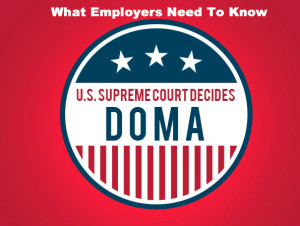 On June 26, 2013, the U.S. Supreme Court, in United States v. Windsor, found that section 3 of the federal Defense of Marriage Act (DOMA) was unconstitutional. This section prohibited the federal government from acknowledging marriages between same-sex couples. Same-sex marriages were recognized as legal by 12 states and the District of Columbia at the time of the ruling. According to legal expert, Roberta Chevlowe, senior counsel at Proskauer,
On June 26, 2013, the U.S. Supreme Court, in United States v. Windsor, found that section 3 of the federal Defense of Marriage Act (DOMA) was unconstitutional. This section prohibited the federal government from acknowledging marriages between same-sex couples. Same-sex marriages were recognized as legal by 12 states and the District of Columbia at the time of the ruling. According to legal expert, Roberta Chevlowe, senior counsel at Proskauer,
“While the court held that Section 3 of DOMA (which defines ‘marriage’ and ‘spouse’ as excluding same-sex partners) is unconstitutional, the decision does not force same-sex marriage on the states, which appear to continue to be free to define marriage as they wish and not recognize same-sex marriage.”
This decision affected over 1,000 federal laws that contain provisions specifically addressing spouses.
So what does the overturn of DOMA mean for employers?
For a legally married couple who live in a state where same-sex marriage is recognized:
- Federal laws governing employee benefit plans will require companies to treat employees’ same-sex and opposite-sex spouses equally for purposes of the benefits extended to spouses.
- Therefore, employer benefit plans should review the definition of “spouse” in all benefit plans to ensure that there is a consistent definition of “spouse” in all plans that do not discriminate against same-sex marriages.
- Employees will no longer have to pay federal income taxes on the income imputed for an employer’s contribution to a same-sex spouse’s medical, dental or vision coverage. And workers can pay for same-sex spouses’ coverage on a pretax basis under a Section 125 plan. Therefore, employers should cease imputed income if they provide same sex spouse health benefits.
- Employers will have to offer COBRA continuation coverage to same-sex spouses.
- Employers with pension plans will be required to recognize same-sex spouses for purposes of determining surviving-spouse annuities. Same-sex spouses must also agree to receive payment of their deceased spouse’s pension benefits in a form other than a 50 percent joint and survivor annuity, with the same-sex spouse as the beneficiary.
- Organizations with 401(k) plans will have to recognize same-sex spouses for purposes of determining death benefits, and same-sex spouses must consent to beneficiary designations.
- Employees must be permitted to take family and medical leave (FMLA) to care for an ill same-sex spouse.
There are still some outstanding questions regarding this new decision such as retroactivity, immigration, state laws, etc. Right now, the above rules only apply to same-sex spouses who were married in and live in a state where same-sex marriage is legal. What remains to be answered is what happens to same sex spouses who live in states that DO NOT RECOGNIZE same sex marriages. Additional guidance is expected in the next few months from the IRS and Social Security.
Referneces:
- Now What? Employer Benefits Obligations Post-DOMA, Stephen Miller, SHRM.org 6/26/2013
- DOMA Ruling Will Change FMLA Administration, SHRM Online Legal Issues, July 2013
- Supreme Court Strikes Section 3 of DOMA, Vacates California Prop 8 Case, SHRM Online Legal Issues, June 2013
- Amending Plan Documents to Recognize Same-Sex Spouses, SHRM Online Benefits Discipline, June 2010
